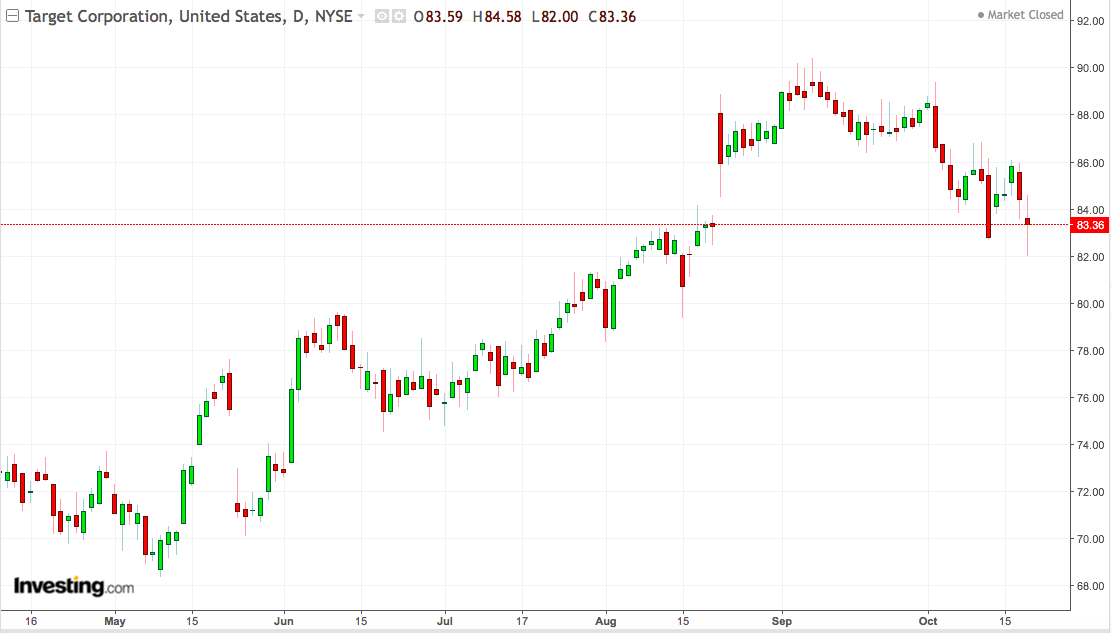After a disappointing 2017, many analysts now believe that Target (NYSE:TGT) has turned a corner. Since the start of 2018, shares of the department store discount retailer are up 25%. Currently trading at $83.36, is the stock headed higher? If so, is now the time to buy?

Focus On the Customer
On February 28th, 2017, Target missed on fourth-quarter results. Comparable sales declined 1.5% over the quarter, profits were sub par, and full-year guidance came in below analyst projections. Target shares sank.
The selloff was the single biggest one-day decline since 1972, when Target first started trading. Shares, which had been trading at $71 at the start of the year fell to $58 after the report.
According to Target's CEO and Chairman, Brian Cornell, the reason for the sales miss was "rapidly-changing consumer behavior." Digital sales were strong but brick-and-mortar sales had decreased.
To counter this, Cornell said that Target would work to improve its digital environment, decrease prices, modernize its stores, offer low-cost private-label goods, and also open smaller stores in targeted communities. This push would result in short-term "headwinds" (reduced profits), Cornell added, but would result in long-term gains.
Cornell's strategy turned out to be spot-on. For the majority of 2017, shares remained volatile. But by November 20th, 2017, when Target released its Q3 report, things had started to turn around. Total sales increased 1.4%, comparable sales increased 0.9%, and Target had a generally rosy outlook going forward.
This focus on improving their customer experience has continued to drive positive results—for its 2018 Q2, Target reported a 6.5% increase in comparable sales, and traffic increased 6.4% for the quarter. Even better? Analysts at Zacks believe this upward trend will continue.
The investment research firm's analysts project Target's full-year revenue will climb by 4.5%, earning the stock a "buy" rating. Additionally, Zacks gave Target an "A" for value. Though shares of Target have increased 50% over the past 12 months, they still lag the retail industry surge of 120%. The icing on this cake? Target's forward price-to-earnings ratio of 15.72 is significantly lower than the discount retail industry average of 22.32, signaling that Target is indeed a good buy.
However, there are some geopolitical risks investors should take into account.
Tariff Headwinds
After US President Donald Trump's late September announcement levying 10% tariffs on $200 billion in Chinese goods, Target shares dropped over 5%. Further, these tariffs will increase to 25% at the end of the year, and apply to over 6,000 types of products including furniture, home goods, clothing, children's products, and other Chinese imports.
Because Target is a discount retailer, anything that increases prices is likely to negatively impact its core customer base. As such, there are two paths that Target could take—and neither is great for investors.
Target could absorb the higher cost of goods. This will negatively impact profit margins, hurting Target's bottom line. Or Target can raise prices, which would negatively impact revenue growth. Neither choice is optimal for the big box retailer.
Nevertheless, despite the implementation of new tariffs, Bernstein’s rates Target's sourcing team as better than many of their other competitors—indeed, among the top 5 nationally. The research firm adds that unless the trade war becomes "global and severe," Target should be able to handle it. This does not, however, mean Target's stock price won't suffer in the interim.
In fact, while analysts at Zacks rate Target a "Buy," the majority of Yahoo Finance analysts have Target at "Hold." These analysts give Target a one-year price estimate of $89.01 per share. With shares currently trading at $83.36, so there's not a significant amount of growth projected, something investors should be wary of.
Bottom Line
There's a fair amount of upside for investors interested in Target. Since 2017, the retailer has improved customers' shopping experience, driving increased foot traffic and boosting comparable store sales.
As well, despite the ongoing US-China trade war, Target, while not completely insulated from price increases, has a fairly good sourcing team that should shield it from a significant margin squeeze. And with Consumer Confidence levels increasing, business conditions are favorable and spending will likely continue to push higher. Finally, for those who like to buy stocks at a discount, Target is a value play.
However, if the trade war continues to escalate, Target's bottom line could take a hit—either from shrinking profit margins or flattening revenue growth. This will, of course, pressure the stock price over the short-term. As for growth, over the next year Target's share price isn't expected to increase considerably.
Thus, while Target has made positive strides, which will likely continue, there's still short-term risk to buying the stock. As such, we see Target as a buy, but only for investors who are comfortable with the risk, and who plan on holding the stock for the next few years.
